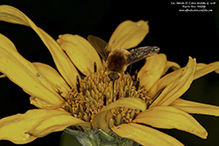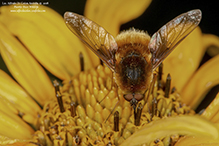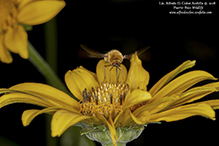Grasshopper bee fly
(Systoechus vulgaris)
Conservation • Description • Habitat • Ecology • Distribution • Taxonomy
Conservation Status |
|||
| IUCN Red List | not listed |
||
| NatureServe | not listed NNR - Unranked |
||
| Minnesota | not listed |
||
Description |
Grasshopper bee fly is a small, stout-bodied, bee fly. It occurs across North America from Massachusetts to Oregon and south to Arizona and Georgia. It is especially common in the Great Plains, where it is the most common bee fly. Adults are 3 ⁄16″ to ⅜″ (5 to 10 mm) long, including the pile (hairs) but not including the elongated mouthpart (proboscis). The body is black but is densely covered with long, pale yellow to dark yellow hairs. It is curved when viewed from the side. The head and the first segment of the thorax are directed downward. The face is covered with abundant long black hairs and fewer yellow hairs that are only half as long as the black ones. The hairs around the simple eyes (ocelli) are black. On the female, the hairs around the mouthparts are often two times as long as the second antennal segment. The antennae have three segments. The third segment is not divided by rings (annulated). The small, knob-like structures on each side of the thorax (halteres) are yellow. The wings are clear and may have a yellowish tint. The veins are yellow or brown. The radius median cross-vein is near the base of the discal cell. The legs are long, slender, and mostly rusty yellow. On the male, the first segment (coxa) and the base of the third segment (femur) are dark. On the female, only the coxa is dark. The last part of the leg (tarsus), corresponding to the foot, has three segments. The last segment has three pads at the end. On both sexes, the tarsus is brown to black. The spines on the legs are yellow. The spines on the tarsus are brown to black. |
Size |
Total length: 3 ⁄16″ to ⅜″ (5 to 10 mm) |
Similar Species |
Habitat |
|
Ecology |
Season |
|
Behavior |
They usually do not land on flowers but hover over them, making these insects especially difficult to photograph. |
Life Cycle |
|
Larva Food |
Grasshopper egg pods |
Adult Food |
The wings are held spread out when a rest. |
Distribution |
||
|
Sources |
|
| 8/27/2025 | ||
Occurrence |
||
Common and widespread |
||
Taxonomy |
|
Order |
|
Suborder |
Brachycera |
Infraorder |
Orthorrhapha |
Superfamily |
Asiloidea |
Family |
Bombyliidae (bee flies) |
Subfamily |
Bombyliinae |
Tribe |
Bombyliini |
Genus |
Systoechus (woolly bee flies) |
Subordinate Taxa |
|
|
|
Synonyms |
|
|
|
Common Names |
|
common bee fly grasshopper bee fly |
|
Glossary
Femur
On insects and arachnids, the third, largest, most robust segment of the leg, coming immediately before the tibia. On humans, the thigh bone.
Halteres
In flies: a pair of knob-like structures on the thorax representing hind wings that are used for balance.
Ocellus
Simple eye; an eye with a single lens. Plural: ocelli.
Tarsus
On insects, the last two to five subdivisions of the leg, attached to the tibia; the foot. On spiders, the last segment of the leg. Plural: tarsi.
Visitor Photos |
Share your photo of this insect. |
||
This button not working for you? |
||
Alfredo Colon |
||
 |
 |
|
 |
 |
|
MinnesotaSeasons.com Photos |
|

Slideshows |
|

Visitor Videos |
Share your video of this insect. |
||
This button not working for you? |
||
|
Other Videos |
|

|
Created: 2/7/2019 Last Updated: © MinnesotaSeasons.com. All rights reserved. |


